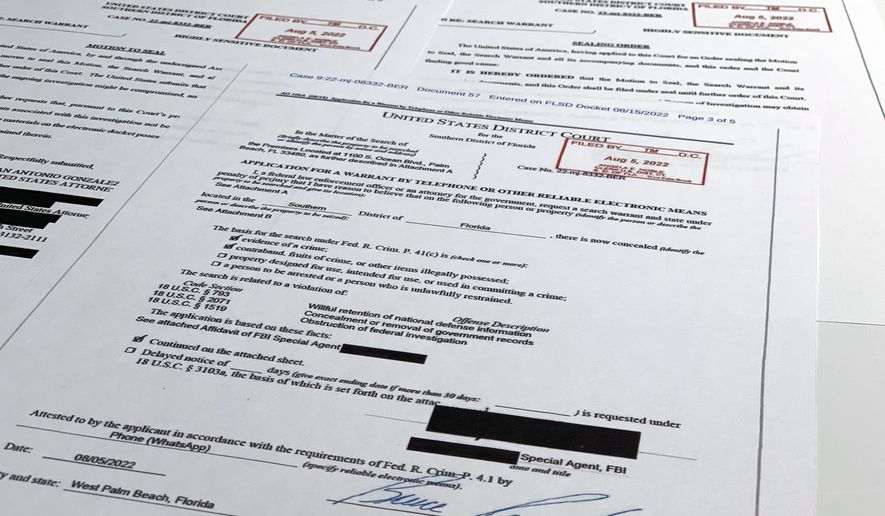Former President Donald Trump on Monday filed a lawsuit asking for an independent legal eagle to review the items the FBI seized from his Florida residence and return anything that wasn’t in the scope of the search warrant.
Mr. Trump’s attorneys argue in the lawsuit that the government, in particular the Justice Department, cannot be trusted to give the former president a fair shake.
They said Attorney General Merrick Garland’s decision to approve the raid roughly 90 days before the 2022 midterm elections “involved political calculations aimed at diminishing the leading voice in the Republican Party, President Trump.”
The lawsuit called on the court to appoint a special master to review the more than 30 boxes of documents and other items the FBI removed in the Aug. 8 raid on Mr. Trump’s residence and office at his private Mar-a-Lago club in Palm Beach, Florida. It was the first-ever FBI raid on a former president’s home.
A special master is a neutral third party, usually, a retired judge, who reviews evidence to decide what materials are protected by attorney-client privilege.
“To date, the government has failed to legitimize its historic decision to raid the home of a president who has been fully cooperative,” Mr. Trump’s legal team wrote in the motion, which was filed in a South Florida federal court.
SEE ALSO: Presidential records found right in Clinton’s drawer
They said the FBI’s history of targeting Mr. Trump, including accusations of political partisanship affecting the FBI’s investigation of Mr. Trump’s 2016 campaign, further justifies an independent review of what items agents removed from Mar-a-Lago.
“In light of recent FBI behavior when President Trump is part of its aim, the court should feel obliged to demand candor and transparency and not just ’trust us’ assertions from the DOJ,” the attorneys wrote. “The appointment of a special master with a fair-minded approach to providing defense counsel with information needed … is an appropriate use of this court’s authority on such sensitive matters.”
A Justice Department spokesman said only that the raid was legal and further comment would come in legal briefings.
“The Aug. 8 search warrant at Mar-a-Lago was authorized by a federal court upon the required finding of probable cause. The Department is aware of this evening’s motion. The United States will file its response in court,” Anthony Coley said.
In 2018, a federal judge appointed a special master to look over the evidence seized from the home and office of Michael Cohen, Mr. Trump’s attorney who later pleaded guilty to tax evasion and other crimes.
Among the items seized during the nine-hour search of Mr. Trump’s residence and office at the private Mar-a-Lago club, the FBI’s evidence log listed 11 sets of classified documents, including some marked top secret and “sensitive compartmented information,” the nation’s two highest designations for classified materials.
A search warrant made public in the past week revealed that Mr. Trump is under investigation for suspected violations of the Espionage Act and other federal crimes related to the mishandling or destruction of classified government documents.
The Justice Department typically uses a so-called filter team to determine whether the evidence seized in a case is privileged. Again, Mr. Trump’s attorneys said the Justice Department’s inflammatory history with the former president makes it difficult to trust the conclusions.
U.S. Magistrate Judge Bruce Reinhart is considering a release of the affidavit that the FBI used to obtain the Mar-a-Lago search warrant.
Judge Reinhart last week gave the Justice Department until Thursday to submit proposed redactions if he makes the affidavit public.
The affidavit lays out the evidence the government has amassed, including witness testimony, and details why investigators believe the evidence of a crime could be found at Mr. Trump’s residence.
Several media outlets and conservative advocacy groups have demanded that the court make the affidavit public. Mr. Trump and his allies, including Republican lawmakers, also called for the affidavit’s public release.
Even if the document is released, it will be a while before the public sees any of it. Judge Reinhart said he would review the government’s proposed redactions before unsealing the affidavit. If he disapproves of the government’s redactions, he said, he will keep it under seal to allow the government to appeal.
Judge Reinhart suggested that he might release his own redacted version while the government’s appeal is pending.
• Jeff Mordock can be reached at jmordock@washingtontimes.com.




Please read our comment policy before commenting.